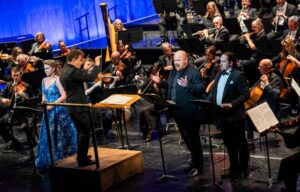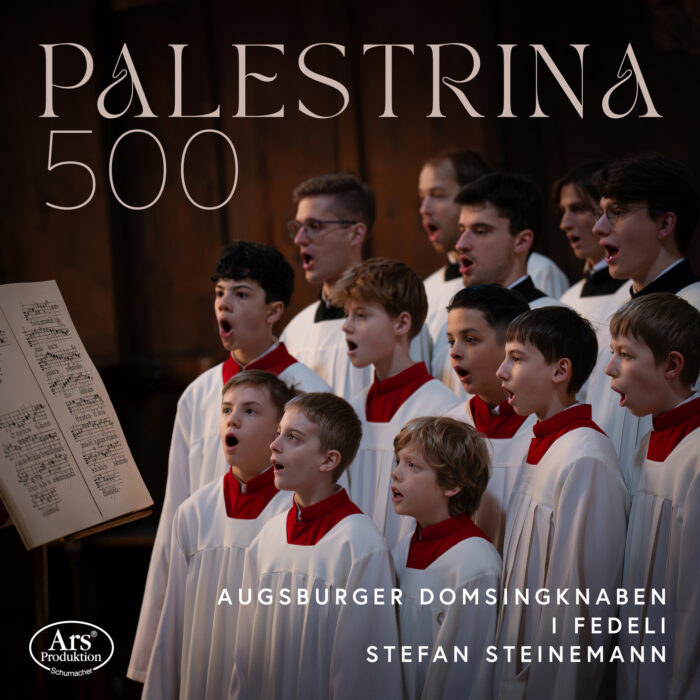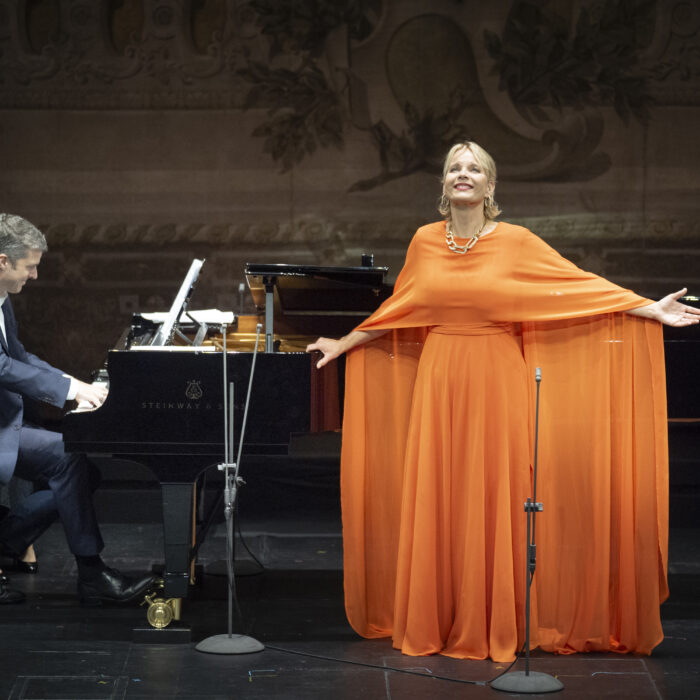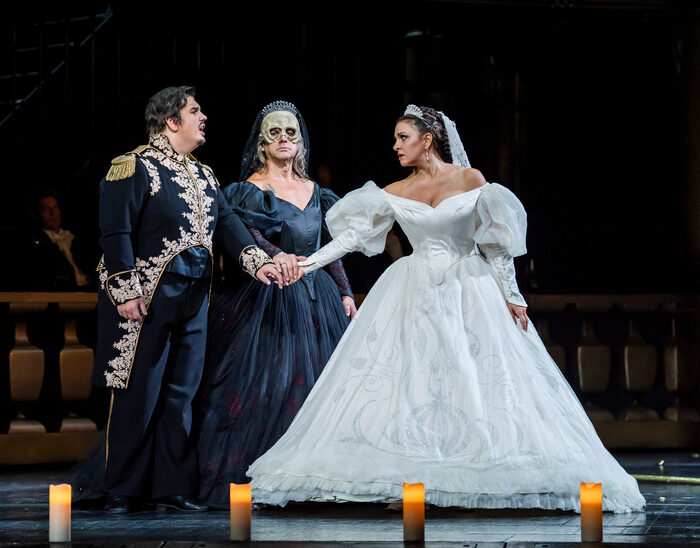
Royal Ballet & Opera 2025–26 Review: Jakub Hrůša and Friends in Concert
By Sophia Lambton(Photo credit: Tristram Kenton)
Profane escapes scale heights heretical in offbeat tales. These contests of one-upmanship with God breed killers; lesser sinners stray with strangers. Dvořák’s unnamed “Spectre’s Bride” – the leading lady of his 1885 cantata – steals away with a dead demon. Four decades later a Chinese adventurer is robbed and killed in Bartók’s “The Miraculous Mandarin,” a one-act ballet. With its deranged range of cursing percussion and tactless staccati, The Royal Opera’s new music director Jakub Hrůša feted his reign.
Trombone glissandi angled randy glances to unleash the piece’s suite. Despite this concert’s unstaged nature, sets were dressed in the imagination. Past minor seconds blaring out of clarinets and zapping pizzicati, three tramps scrambled to find cash. When the desired stash remained amiss, a miss was hired to procure a victim. With the gift of specious promises, she crafted lockspiels: Bartók’s term for a seductive dance. Col legno violins tapped like a ticking clock to set the working girl a deadline; sextuplets on the clarinets piqued interest. Arpeggios’ zest on cellos showed the client’s promise but a snare drum mimed suspicion. Empty pockets made the hustlers ditch their bait.
With bated breath, strings triggered tremolo to raise the stakes. At the arrival of the titular protagonist, vile violins assumed sul ponticello tones; trombones derided him. Trills spilling along flutes and oboes boasted of illicit thrills, but they were scarcely ripe for picking. Sticking weapons through his flesh, the vagrants brawled amid horns’ ffff glissandi.
Cue a rhapsody in chaos. Flutes’ tooting triplets overthrew the pleading odes on harp; attacked acciaccaturas championed petty theft. Through hefty semiquavers’ tight fortissimo, their victory was sealed. Death was the consolation prize.
A dirge on cor anglais laid the deceased to rest in Dvořák’s “The Spectre’s Bride:” a cantata that takes after Karel Jaromír Erben’s ballad “The Wedding Shirt.” Its blemished memories became a chasm, distancing a girl from her late mother, father, brother, sister, and lost love. Horns dauntingly corrected – scrambling in staccati apt to lecture. But the wistful violins resisted, galling with nostalgia.
Rapture raced to grasp elations past in strings’ vibrato. Mollifying tremolos quelled angst, but flutes imbued pursuant glee. In doleful ardor, the reflecting bride replayed her life.
When her neglectful suitor surfaced, a narrating baritone and chorus augured evil. Villainous was this foreboding tenor: maybe Satan’s acolyte.
Cellos’ tolling pizzicati seemed to count the steps to death. Between the inner conflict of horns’ roars and flutes’ mellifluousness the fiancée felt misguided. Dwelling on her bridegroom’s orders, Kateřina Kněžíková sculpted plangent triplets and despondent sighs. In this Royal Opera debut the soprano’s silvery vibrato limned a burning urge to love. Her treasure had been taken from her “like a pebble tossed into the sea” and yet she clung to nubile bliss. Adorable monotony in flutes’ idyllic chords unspooled her dreams of marital routine; the high F in “počkej jen do dne – není moc” (“just wait until dawn – it won’t be long”) lushly pulsed.
Adhering to her mortal god’s commands to sever ties with rosaries, the would-be wife was blind to sacrilege. Legato cries pledged worship of the Virgin Mary and her son in the cantata’s final chapter. Through a penitent high G flat Kněžíková met catharsis. The expiring bride was spared.
Boorish throbs abhorred religion in the disavowals of Nicky Spence, here substituting for an ailing Pavel Černoch. Crassly calling for his love, the tenor’s portrait of the role showed little ambiguity. “Pěkná noc, jasná” (“A beautiful, clear night”) emerged with volatile aplomb.
Denouncing prayer books, Spence proffered sounds of sublime blasphemy. Triplets over “Zahoď je pryč” (“Throw them away”) ordained audaciously. In more duplicitous endeavors he occasionally faltered. The high F sharp of the tenth section’s “Pěkná noc” was strained; falsetto leant an airiness to “Co máš, má milá, za pasem.” Expression was served best throughout the middle register.
Pavel Kubáň banished hubris with imperious vibrato. Penning episodes of peril with a bristly timbre, the performer menaced in “Byla noc, byla hluboká” (“It was night, it was deep”), deploying portents in each consonant. “Knížky jí vzal a zahodil” (“He took her prayer books and threw them out”) was dealt a taunting undertext. Scare tactics shaped “Růženec popad, zahodil” (“He took the rosary and threw it out”) with similar alarm. Celestially suspenseful, the majestic baritone made subjects of his audience.
Deploring dangerous infatuation, the Royal Opera Chorus soared. Crisp diction decorated doctrine; trills filled with compassion. In lashing warnings the ensemble incarnated the dual role of Preacher and Confessor.
Crescendo restlessness on horns sent seascapes coruscating in our minds at Hrůša’s peerless helm. Embellishing the score with watercolor tears, the master marshaled flutes to tremble from both fear and fervor; rage and rue. False fanfares fanned obsession’s flames in arpeggiated chords on harp and startling strings stirred tempests. Imitations of the choir’s cautions echoed manmade tremors.
At the denouement of this cantata the recanting heroine was granted God’s forgiveness through the triangle’s complicit tingles. Though its beater had bled treble caveats, the instrument leant clemency. A humble oboe seemed to be the woman’s only friend. But flutes began to root for her in light staccato cheers; octuplets fluttered on the violin. A trance delayed the closing chord in tense anticipation, stalling the girl’s fate.
Contrasting strata steered the instruments to lyrical unknowns in this ennobling rendezvous. At the unbeatable baton of Jakub Hrůša a despairing creature was rechristened; listeners ensconced in a new cosmos.
The epiphany was twofold.



